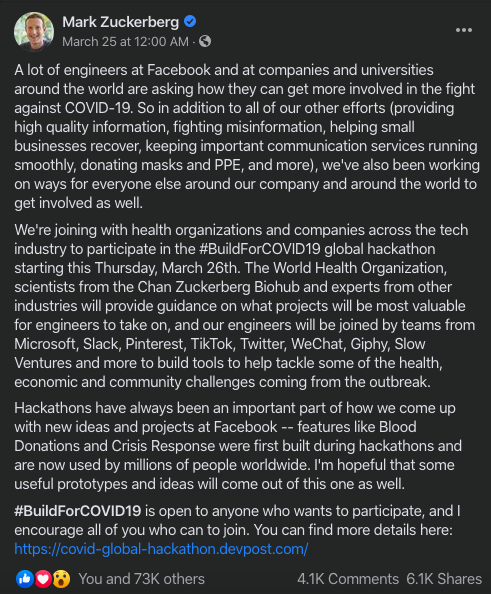Covid-19 has affected the world in a very devastating way. Many countries around the world are recording increases in positive cases on a daily basis. These cases and deaths due to the pandemic has resulted in many governments around the world instituting measures aimed at curbing the spread of Covid-19 which include total lockdowns. These lockdowns, for example here in South Africa, can be for 21 days where individuals are not allowed to leave their homes except for food supplies or medical needs.
These strict lockdown measures have left many around the world for example the underprivileged, the aged, small businesses from various sectors hugely affected and struggling to get by. This has led to many institutions in various sectors including myself looking at ways to help in this dire time.
The Hackathon
I came across a post from Mark Zuckerberg on March 25th 2020 asking software engineers from around the world to join in the fight against Covid-19 by participating in the #BuildForCOVID19 global hackathon. This hackathon was a collaboration with health organisations including the World Health Organisation (WHO) and companies across the tech industry with a goal aimed at building software solutions that aid in tackling some of the health, economic and community challenges facing the world right now. The engineers in the hackathon were joined by teams from Microsoft, Slack, Pinterest, TikTok, Twitter, WeChat, Giphy, Slow Ventures and more. I had no hesitancy in joining this hackathon in helping in this fight against Covid-19.

I signed up on DevPost as well as on Slack where the majority of the hackathon communication between the different teams took place. On Slack engineers would collaborate with other like-minded industry specialists, build or add to a team and turn their project idea into either a live working solution or a prototype. I came across a Slack post from FerasNaser.com for a project that was in need of engineers including Android to which I reached out.
I was invited to a Slack channel where in addition to the virtual meetings we had on Google Hangouts and Zoom, we coordinated with each other around the completion of our prototype. We had our first Google Hangout where we had introductions and Feras gave us a run down of the different potential projects he had in mind from which we were to pick one for the hackathon.
We all agreed on an educational solution for rewarding children with a virtual currency for completing a course on our platform. The aim of this project, which we called LIAM, named after my second-born son, was to allow children to learn, earn, create, sell and buy their creative achievements.
LIAM
Our multinational team consisted of Feras Naser an entrepreneur from Jordan who conceptualised the project idea; Eric Malaba from Uganda who configured our server using Cloudinary and Heroku and fulfilled the role of Web Tech Lead; Mohammed Thasheel from India, a React developer who helped build the website frontend; Sid Anand a student from Canada helped configure our backend; Joshua Odoi from Ghana who contributed to the website design flow and development and I served as Mobile Tech Lead and built the Android prototype app.
We hit the ground running with development starting from the night of Friday 26th March 2020 getting the backend ready for the mobile app and website. We had meetings at various points across the hackathon to discuss the progress and address any issues we might have had.
Lessons learnt
Towards the end of the hackathon we had issues deploying our backend server to a public environment accessible to the frontend clients. Due to this delay it left very little time for the frontend clients especially Android to integrate the backend API on time. Our product then had to be a prototype as the live data was not quite ready for the frontend clients. Trying to sort out these issues was a real challenge for the team and each member was feeling the pressure to deliver a product we would all be proud of.
We all coded furiously across the hackathon period until the night of Sunday 28th March with very little rest in between. From working until late the Friday and Saturday then waking up at 5am to resume coding again. Despite the little rest we were all motivated by the potential impact of our project for children around the world, we all wanted this product out there for the world to use one day. We all pushed through the various technical issues we had and submitted our project the Sunday night.
Each of us can help in one way or another during this devastating time facing the world, offering our services to those in need. Identify a need in your community or around the world that you could help address. By working together we can beat this pandemic.
